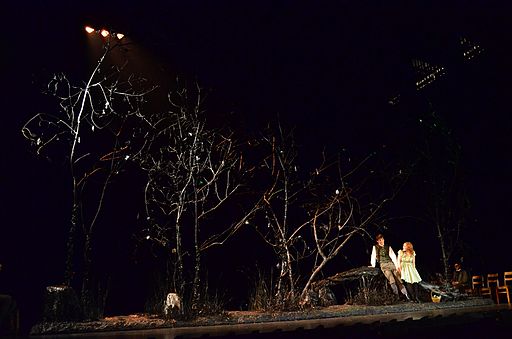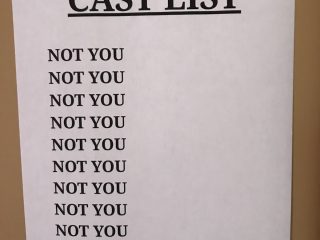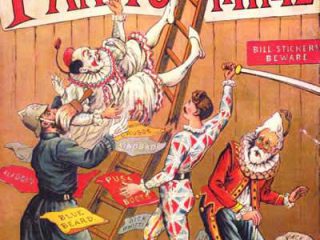As the theatre works to appeal to younger audiences, teen-centric plays and musicals are becoming increasingly common. Be More Chill, Dear Evan Hansen, and The Curious Incident of the Dog in the Night-Time are just a few recent shows featuring lead teenage characters. There are also classics like Grease and Spring Awakening. But oftentimes, teenagers are played by young adults who are significantly older than the character’s given age. Why is this? When should a teenage role be played by an adult versus a teenager? What factors should directors consider when casting these roles, especially if challenging content is involved?
Teenage roles being played by adults has been a norm since shows centering teenagers started appearing in the theatre canon. Take the musical Grease – Barry Bostwick was 27 when he originated the role of 18-year-old Danny Zuko on Broadway in 1972, and the 2007 Broadway revival featured 22-year-old actors in the roles of Danny and Sandy. In this case, having young adult actors play the teenage characters makes the show’s language and content more palatable. Grease has sexually explicit lyrics, the use of cigarettes and alcohol, and a pregnancy scare. All of these are omitted from the high school version of the show, suggesting a perception that audiences just aren’t comfortable watching a show where actual teens embody that kind of content.
Spring Awakening is another example of a teen-centric show that involves challenging content and whose teenage characters are usually played by young adult actors. This show deals with puberty, adolescent sexuality, and physical and sexual abuse. There’s no high school version of Spring Awakening, which is perhaps why it is rarely performed outside of college and professional or semi-professional productions. But is the idea that teenage performers should be sheltered from this sort of content misguided?

Tindolent, CC BY-SA 3.0, via Wikimedia Commons
Despite the challenges and concerns about how audiences would receive it, Hoboken High School in New Jersey took on Spring Awakening in 2018, with minor edits to the language approved by the show’s creators. Shows like Rent have also been performed at high schools. There is a school version of Rent that omits or alters the profanity and sexually explicit lyrics, but the themes of AIDS and homosexuality are left intact. When a high school in the San Francisco Bay area produced the school version of Rent in 2008, some students were initially uncomfortable with the show’s content. The actor who played Angel, a gay man who cross-dresses, received some backlash from his parents and was the target of homophobic bullying from other students. But the school’s drama teacher said in an interview that he was glad the school produced the show because it gave students the opportunity to engage with and discuss serious issues. The director of Spring Awakening at Hoboken High School expressed similar sentiments, as did the students.
Whether these kinds of shows should be performed by teenagers ultimately depends on the actors and the sensibilities of the community where the show is produced. What’s acceptable to one community may not be acceptable to another. Regardless, these roles require mature performers and a director who feels equipped to guide them through challenging material. Teens aren’t often fully equipped with the coping mechanisms to healthily put themselves into the emotional and psychological circumstances called for by difficult roles. And there are practical considerations to consider, too. Sometimes a role may simply be too vocally demanding for a teenager whose voice is still developing and who probably doesn’t yet have adequate training and experience.
Of course, there’s still a strong argument for teenagers portraying themselves on stage, especially as the demographics of theatre audiences shift. And demographics aside, sometimes a play is written in a way that just works best with teenage actors. Lauren Gunderson’s I And You, a two-person play with teenage characters, is one example. Without spoiling anything, I’d argue that the play’s emotional gut-punch just wouldn’t work with adult actors. There’s also Frances Goodrich and Albert Hackett’s classic The Diary of Anne Frank. Susan Strasberg was 17 when she originated the role of Anne Frank on Broadway. The themes that the play explores through Anne’s character are best illuminated with a teenage actor in the role. In both plays, there are romantic undertones between two teenage characters, making it equally important that a teenage actor also be cast as the love interest.

When teenagers are cast in challenging roles, it’s important to bring in help to ensure their physical and mental well being is looked after. Intimacy coordinators can help stage scenes that require intimate contact, or the portrayal of intimate contact. School counselors can also help provide guidance on diving into challenging topics. Teachers and directors should reach out to the community and bring in people who can help navigate challenging topics and provide guidance on how to portray them in a realistic, sensitive way. Non-profit organizations are good places to start.
Especially in a school setting, I think transparency should be the name of the game. Drama teachers I know who have produced challenging shows did everything they could to invite the involvement and cooperation of their school and community. This included professional development sessions and parent information meetings to provide information about the show, the content, and how it might benefit the students and the community. Being as forthright as possible in advance helps “soften the ground” when it comes to challenging shows. At the very least, directors should send home a permission form for parents to sign off that they’ve had the opportunity to review the script and approve of their student participating in the production.
Transparency should also be part of the audition and casting process. Directors should post descriptions of the characters and briefly list anything for each role that may be challenging or uncomfortable. Parents should also be fully informed about what their student will be expected to do and what safeguards will be in place.
There’s no one-size-fits-all answer for casting teenage roles. Factors like educational opportunities, audience and community sensibilities, and the maturity and skill level of the performers all come into play. Sensibilities are continuously shifting, as are the demographics of theatre audiences. As that happens, this conversation will undoubtedly shift with them.














